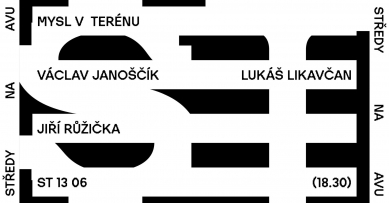
Wednesdays at AVU - Mind in the Field
Source
Akademie výtvarných umění v Praze
Akademie výtvarných umění v Praze
Publisher
Tisková zpráva
13.06.2018 08:20
Tisková zpráva
13.06.2018 08:20
Czech Republic
Prague
In current thought, there is an increasing trend towards a return to ontology and a tendency to think about the external (non-anthropocentric) world and our approach to it. The publication *Mind in the Field* aims to bring these approaches closer to the forefront of contemporary philosophers. We intend not only to present the book within the series *Wednesdays at AVU* but also to offer various perspectives and more general outlines of realistic
philosophy in the 21st century.
The presentation of the book will take place in the AVU Auditorium on Wednesday, June 13, 2018 at 6:30 PM.
Technical service is provided by Digilab.
Lukáš Likavčan, Václav Janoščík, Jiří Růžička (eds.)
The anthology Mind in the Field is an introduction to contemporary philosophical realism within the diverse currents of object-oriented ontology, new materialism, or speculative realism. The introductory study by Lukáš Likavčan, Václav Janoščík, and Jiří Růžička allows the Czech academic and artistic audience to navigate the basic coordinates of current speculative thinking, and the following nine translated texts map this complex terrain and provide the latest insights into ontology, epistemology, environmental and political philosophy, or the theory of science. Among the texts, we can find rationally oriented essays by researchers such as Alain Badiou, Quentin Meillassoux, or Ray Brassier, object-oriented and materialist concepts by Levi Bryant, Timothy Morton, Jane Bennett, or Isabelle Stengers, as well as political-theoretical interventions by Reza Negarestani and the xenofeminist collective Laboria Cuboniks. These essays serve as gateways into a wide range of debates taking place at the forefront of today’s philosophical avant-garde, which seeks to grapple with the legacy of (post) Kantian philosophy, phenomenology, analytical philosophy, and post-structuralism. In a new way, old questions about the knowability of the thing-in-itself, the architecture of human cognition, the position of humans in the planetary network of non-human actors, or the possibilities of a universalist emancipatory project are thus posed here.
philosophy in the 21st century.
The presentation of the book will take place in the AVU Auditorium on Wednesday, June 13, 2018 at 6:30 PM.
Technical service is provided by Digilab.
Lukáš Likavčan, Václav Janoščík, Jiří Růžička (eds.)
The anthology Mind in the Field is an introduction to contemporary philosophical realism within the diverse currents of object-oriented ontology, new materialism, or speculative realism. The introductory study by Lukáš Likavčan, Václav Janoščík, and Jiří Růžička allows the Czech academic and artistic audience to navigate the basic coordinates of current speculative thinking, and the following nine translated texts map this complex terrain and provide the latest insights into ontology, epistemology, environmental and political philosophy, or the theory of science. Among the texts, we can find rationally oriented essays by researchers such as Alain Badiou, Quentin Meillassoux, or Ray Brassier, object-oriented and materialist concepts by Levi Bryant, Timothy Morton, Jane Bennett, or Isabelle Stengers, as well as political-theoretical interventions by Reza Negarestani and the xenofeminist collective Laboria Cuboniks. These essays serve as gateways into a wide range of debates taking place at the forefront of today’s philosophical avant-garde, which seeks to grapple with the legacy of (post) Kantian philosophy, phenomenology, analytical philosophy, and post-structuralism. In a new way, old questions about the knowability of the thing-in-itself, the architecture of human cognition, the position of humans in the planetary network of non-human actors, or the possibilities of a universalist emancipatory project are thus posed here.
The English translation is powered by AI tool. Switch to Czech to view the original text source.

0 comments
add comment
Related articles
0
09.05.2017 | Wednesdays at AVU - Maria Topolčanská: What is the theory for?
0
22.11.2013 | Wednesdays at AVU - Pavlína Morganová
0
09.05.2013 | Wednesdays at AVU - Big Bang
0
18.04.2013 | Wednesdays at AVU - Creative Possibilities of Exhibition Curators
0
04.01.2012 | Wednesdays at AVU - Václav Bělohradský: Parts without Participation: on Post-Societies
1
20.11.2011 | Wednesdays at AVU - Imro Vaško: Why? How? What?
1
04.11.2011 | Wednesdays at AVU - Finalists of the Jindřich Chalupecký Award









